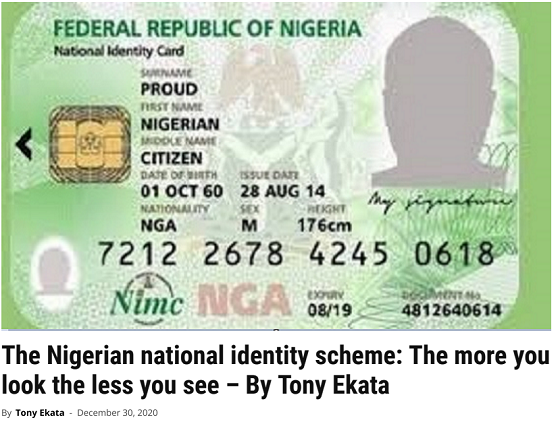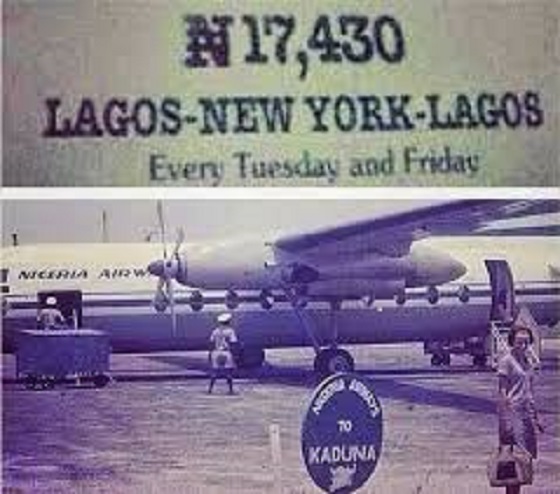Post Published on February 29, 2024 by Anthony Ekata
The National Identity Scheme: The more you look the less you see
(First published December 30, 2020)
The Nigerian government has extended the deadline for telecommunications companies to block SIM cards not integrated with national identification numbers (NINs) to 9 February 2021 at the latest. This is no breaking news. The extension was agreed on at the meeting of the National Task Force on NIN and SIM Registration held in Abuja, the nation’s capital.
This deadline does not apply across the board. Subscribers without NIN registration will get the full six-week extension. There will be a three-week extension for subscribers who have their NIN but are unable to integrate it with their SIM cards. This takes the deadline from 30 December to 19 January 2021.
According to DEVELOPING TELECOMS, the Nigerian government has reportedly licensed 173 centres and 30 state government institutions to conduct the enrolment of NINs across the country. But only about 43 million Nigerians have enrolled for their NIN. This leaves tens of millions of subscriptions unaccounted for. Will the extra few weeks be sufficient for these millions of Nigerians to integrate their SIMs?
There are other questions that require answers in the midst of this uncertainty. A few crucial ones raised at a media forum are:
- Must you be a Nigerian to obtain a NIN from NIMC?
- If the answer to Q1 above is “Yes”, does that mean that non-Nigerians cannot obtain SIM cards in Nigeria, since you now need a NIN before your phone can be active in Nigeria?
- Can non-Nigerians obtain NIN for their SIM cards while in Nigeria?
The fact that these ‘puzzles’ exist, even among media professionals, speaks to the level of awareness created around NIN by the initiator – the Federal Government. Ordinarily, the media should be a major stakeholder in this enterprise, but the way the media is treated in Nigeria, either out of disdain or ignorance or both, would not allow for that. The fault does not stop at the doorstep of the government, though. Many leaders of the media fraternity who should be baying at this misnomer, are compelled by circumstances to dine regularly, gratis, with the government and its agents who make sure they provide takeaway dessert for their guests. And we all know that it is bad manners to be eating and talking at the same time.
Anyway, that is a different topic.
The very noble idea of the national identity management scheme is standard practice for any government that is serious about planning. The innumerable rolling plans in Nigeria that rolled into oblivion without achieving their objectives were essentially derailed by the lack of an authentic database of the people for whom the plans were meant. That is why, for instance, we are celebrating the ‘milestone’ achievement by this government of providing some 5,500 megawatts of electricity for a population of over 200 million people, while South Africa is making concerted efforts to increase its supply of 58,000 megawatts of electricity from all sources for its 59.62 million people (according to Statistics SA).
Below is some information on the national identity management scheme, initiated in 2007 with the establishment of the National Identity Management Commission (NIMC) to create, manage, maintain, and operate a unified National Identity Database for Nigeria.
An effective national identity management system is critical to the development of any economy. It provides a universal identification infrastructure for a country that enables access and means to confirm the identity of individuals residing in a country. Thus, proper economic planning, adequate intelligence gathering and a functioning internal and external security architecture will be difficult to achieve in the absence of a robust national identity system (which is usually comprised of a central identity repository or database).
In recognition of the foregoing, the National Identity Management Commission (“NIMC”) was established in 2007 pursuant to the NIMC Act to create, manage, maintain and operate a unified National Identity Database for Nigeria. To this end, the NIMC, which replaced the defunct Department of National Civic Registration, is required to carry out the registration of all registrable persons in Nigeria and thereafter issue a General Multipurpose Identity Card (“National Identity Card”) to each registered person.
In terms of the NIMC Act, registrable persons comprise the following:
- Any person who is a citizen of Nigeria;
- Any person who is lawfully and permanently resident in Nigeria, whether or not he is a citizen of Nigeria;
- Any non-citizen of Nigeria who is lawfully resident in Nigeria for a period of two (2) years or more.
The information that may be obtained and stored in the National Identity Database about a registrable person include full names; other names by which the person is or has been known; date of birth; place of birth; gender; address of the person’s principal place of residence in Nigeria; address of every other place in Nigeria where the person has a place of residence; passport photograph; signature; fingerprints and other biometric information of the person. In addition to the foregoing, information in respect of a registrable person relating to nationality; and entitlement to remain in Nigeria together with the attached terms and conditions (if any) may also be recorded in a registered person’s entry in the database.
The National Identity Card issued upon completion of the registration process bears a unique National Identification Number (“NIN”), which is assigned by the NIMC to each registered person in the National Identity Database. The unique NIN is required to be incorporated into or made compatible with other existing identity-related databases/registers containing information/data relating to the registered person.
Legal Significance of the National Identity Card
As provided in the NIMC Act, registration and procurement of a National Identity Card is compulsory for all registrable persons in Nigeria. In this regard, there are no age restrictions for registration and possession of the National Identity Card. Hence, any person born in Nigeria since the introduction of the NIN is required to be registered within sixty (60) days of their birth, or at any time after this period not exceeding one hundred and eighty (180) days, or any other period as the NIMC may specify from time to time by regulation. For Nigerian citizens born outside the country, the NIMC Act does not specify a time frame within which they are to register and obtain the NIN but it should be noted that registration is also compulsory for this class. Hence, the NIMC has initiated the Diaspora Enrolment Programme and licenced some InfoTech companies which, working with foreign partners, are to carry out the enrolment of Nigerian adults and children in the Diaspora into the National Identity Database.
The NIN is required to be presented by registrable persons before several basic transactions can be undertaken in Nigeria. Specifically, all registrable persons are required to state their NIN while engaging in transactions including the following:
- Application for, and issuance of a passport;
- Opening of individual and/or personal bank accounts;
- Purchase of insurance policies;
- Purchase, transfer, and registration of interest in land (subject to the Land Use Act); Transactions relating to pensions and Health Insurance Schemes;
- Consumer credit transactions (phone contracts fall in here, hence the need for SIM registration)
- Payment of taxes;
- Registration of voters; and
- Transactions having social security implications.
- Registration for, and provision and use of hospitality services;
- Registration and licensing for, and use of health or medical services;
- Application for the adoption of an infant, child or person under applicable laws; Purchase and registration of aircraft, ships, boats, motor vehicles and motorcycles; Registration and use of aviation services by airline operators and customers; Boarding of aircraft, trains, commercial vehicles, ships and boats;
- Purchase of travel tickets or tokens for air, rail, road and water transportation; Acquisition, sale or transfer or transmission of shares or equities and other financial instruments;
- Enrolment into primary, secondary and tertiary schools and continuous professional studies in Nigeria.
- Registration of companies, sole proprietorships, partnerships and non-profit organisations and other post-incorporation documentation with the Corporate Affairs Commission; and
- Filing and registration of criminal and civil actions in courts or other arbitration processes.
Specifically, Section 27(2) of the NIMC Act provides that any authority or organisation to which a person applies to carry out any of the above-listed transactions (or any other transaction as may be prescribed by the NIMC in a Federal Government Gazette [such as SIM integration]), shall request such person to produce their National Identity Card or NIN. Thus, a person (individual or corporate) who violates any of the provisions of the NIMC Act or permits the carrying out of any transaction covered by the NIMC Act without a NIN, commits an offence punishable with various fines and terms of imprisonment (as appropriate) in line with the provisions of Sections 28, 29 and 30 of the NIMC Act.
The significance of the SIM integration lies in the fact that once a user’s SIM is linked to their NIN, the user’s phone number can serve as an authentic substitute for the confirmation of their identity. In South Africa, for instance, to perform a personal bank transaction, you are required to confirm your identity with your National Identification Number (NIN), passport number (if a non-resident foreign national), date of birth or cell phone number, or all the above, if necessary. It is important to point out that non-citizens who are permanent residents (like yours sincerely) have their own NIN which usually begins with the year, month and day of birth.
The NIMC issued a public notice specifying January 1, 2019, as the FGN-approved commencement date for the enforcement of the NIN Mandatory Use Regulations and the consequent application of appropriate sanctions and penalties for non-compliance. Consequently, all registrable persons are required to provide their NIN to be able to carry out the above-listed transactions (and any other transactions that the NIMC may determine by regulation (such as SIM registration and activation) from the stated date.
We all know that January 1, 2019, is almost 2 years ago. For a scheme that was initiated 13 years ago to still be dogged by postponements, despite the billions of naira sunk into it, is a further manifestation of the ‘Nigerian factor’. A bigger puzzle is how Nigerians manage to entrust their fate into the hands of incompetent leaders in all spheres repeatedly.
The latest shoddy SIM integration exercise is so irksome that a renowned journalist, Simon Kolawole, described it as daft. Simon asked:
“So, my 75-year-old mother will have to go and queue up with the crowd to get a national identification number (NIN) in this season of COVID-19 — which targets her age group? And if she doesn’t take the risk of catching COVID within two weeks, you will cut off her mobile line? And, then, my mum and I would not be able to communicate? You will disconnect her line, deny telecom companies income, block vital tax revenues for the government in these hard times, stifle the growth of the life-saving telecoms sector and further shrink an economy that is already in recession? This is yet another concrete evidence of the wretched quality of thinking in government. Daft.”
How much has the Nigerian government spent on the National ID Scheme since 2007? The answer is blowing in the wind!
From Random Thoughts: A Collection of Essays and Poems
By Tony Ekata
First published on Newsplus.com.ng (defunct)







